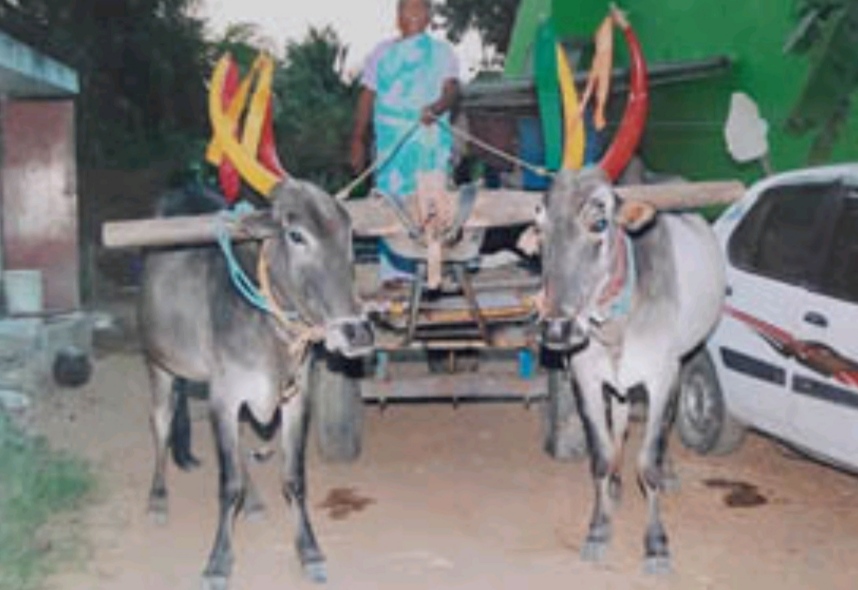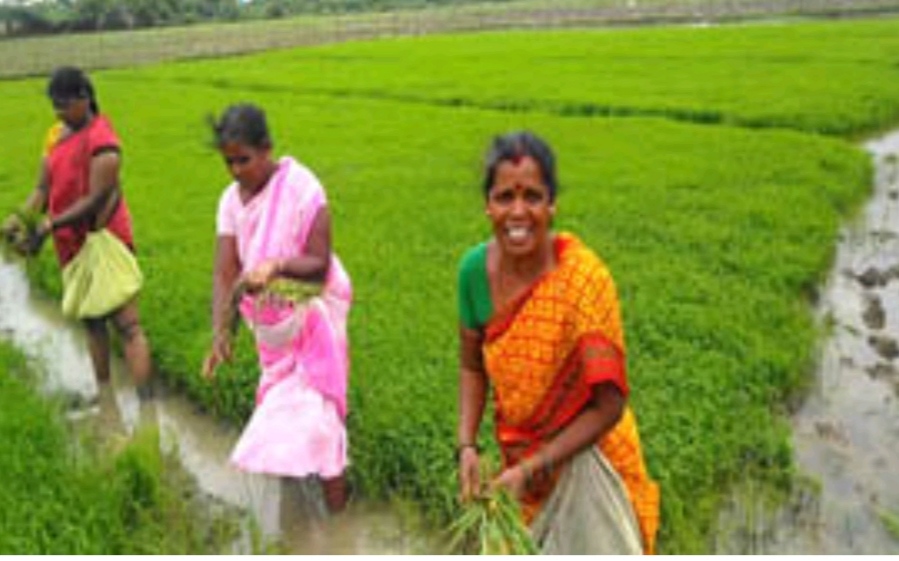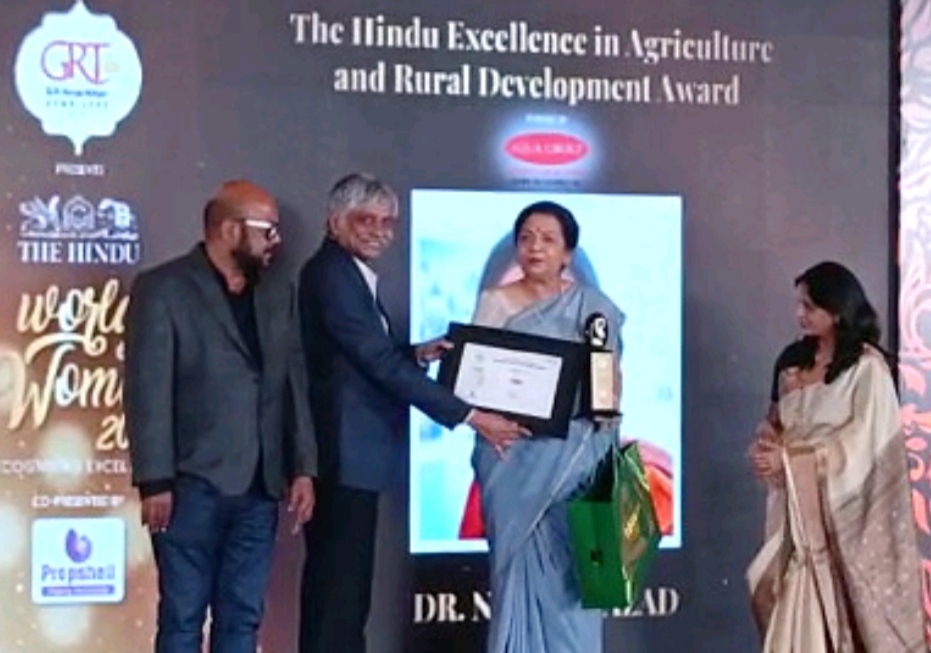Dr. Nandini Azad wins “The Hindu” – World of Women 2023 award for Excellence in Agriculture & Rural Development


Dr. Nandini Azad, President Working Women’s Forum – Indian Cooperative Network for Women was honoured with The Hindu – World of Women Award for Excellence in agriculture and rural development on 31st of March 2023 at Leela palace, Chennai.
Talking at the event, Dr. Azad, quoted statistics on women farmers in India & how landless women farmers are transformed as owners of land through WWF-ICNW inputs by highlighting the case. Enhancing assets & status base.
91% of women are in informal sector, with low income, no bargaining power & powerless empowerment. Approximately 75% of full-time workers on Indian farms are women, with less than 8% of women farmers owning land. Working Women’s Forum – Indian Cooperative Network for women, through, financial inclusion & capacity building, have nearly 34% of women farmers members are now with land titles to address core of gender inequalities in agriculture. Strengthening of personal ability and self-confidence (95%) due to exposure, training and mass meetings. Deciding on what crop to grow, marketing strategies & profit making (i.e., decision making). Most of our women members generate employment to other women with their children as doctors & engineers, especially investing in girl child education today.
For an Instance, Padmavathy from Kalakatur Village, Kancheepuram (22 year member of ICNW), a daily wage labourer received finger millet as ragi kind wages. Experienced starvation with one time porridge, met ICNW organiser. Her first loan amount was Rs.400 (in 2003). In the next loans she bought a Bullock, rented it & continued to be wage earner. With the subsequent loans & savings (custody of income), she bought 5 cents of land on her name. ICNW training made women farmer members keep titles on their name, shifting land owning practices with long term response.
Educated her son & also involved him in the family farm, employed 3 other women in the farm business. Later purchased a cow & started dairy business with her profits from marketing vegetables she grew (managed by her daughter in law). In the category of agriculture we include, livestock, fisheries, horticulture & aquaculture. With diversification in her business, later in her 10th loan cycle, she bought 25 cents of land again. Her one time meal became three nutritious meals in a day, turning wage labour to land owner (women led development) in 12 loan cycles. ICNW promotes livelihood of the poor women members through responsible investment in agriculture with inputs in loans, capacity building, gender awareness regarding land titles, deciding crops, diversification, custody of income.
Providing digital financial literacy during pandemic made many rural women to carry on their occupations. The brave fisher women group of 5 members in coastal TamilNadu, Adiramapattinam fought supply chain disruption. Initially they faced exploitation from middlemen, auctioneers also unavailability of credit to buy fish for selling and client differential choices made them starve & face loss. Through ICNW’s continuous loaning, they eliminated the middlemen/ auctioneers, wholeseller by taking over auction process. The head would auction the fish, two of the members sold in markets, Meenatchi sold the fish as head loader and Thangeshwari process the remaining fish & sold as dry fish to the customers. They also bought a boat and net for their household, husbands i.e., assets by creating their own supply chain through continuous loaning, financial inclusion.
Having reached 6,00,000 women members across 4 states in South India (TamilNadu, Andhra Pradesh, Karnataka & Telangana) in 280 occupations. The voices of poor women are heard in global high tables with representation at the World Farmers Organisation (large at independent voice of farmer), International Raiffeisen Union (oldest cooperative union) as board members, only women to be elected in 50 years. Recognised in UN Commission on Status of Women & Commission on Social Development as only cooperative in major UN H.Q events (last 2-3 years). As the Global Facilitator of working group on cooperatives, in WFO Dr. Azad represents poor women farmers cooperatives globally.
The case of Saroja, a marginal farmer from Kancheepuram, started poultry farm, faced loss due to market imperfections. Due to continuous loaning and technical knowledge made her grow chicken feed in her land and used chicken waste as manure (organic manure) for mango trees in her farm. These methods are promoted by WWF-ICNW along with compost pit, waste management & practicing Ayurveda, the science of plants, by which poor rural women are transformed as green warriors as a defence. As it is hard to separate gender & climate change, a new climate financing pipeline has started.
Madam Hillary Clinton, as US Secretary of State visited ICNW in 2011 to observe its operation and also interacted with the women entrepreneurs, admiring the unique new age cooperative governed by grassroots women. World leaders and the inter-governmental process have been increasingly admiring WWF-ICNW’s ‘Gender and Equity Model of Empowerment’ as an holistic example for the UN SDG.
Women’s representation in co-operatives at higher echelons is not significant at decision making levels – new trends, decisions, issues indicate new threshold of change for women.
The International Network for women in cooperatives provides a glimmer of hope for international awareness of enforcement of conventions, restoring gender balance, gender networking in cooperatives and success of new age women-only co-operatives that are trendsetters.
Dr. Azad concluded her speech by thanking Kasthutri & Sons, The Hindu Newspaper, Jury members, event managers and congratulated all amazing women awardees.
Other sectoral awards went to business leadership, sports, music & entertainment in 13 category.


